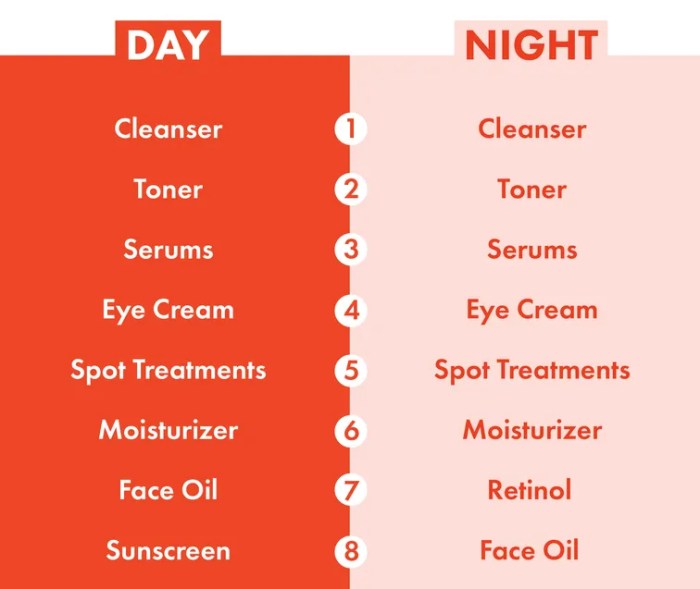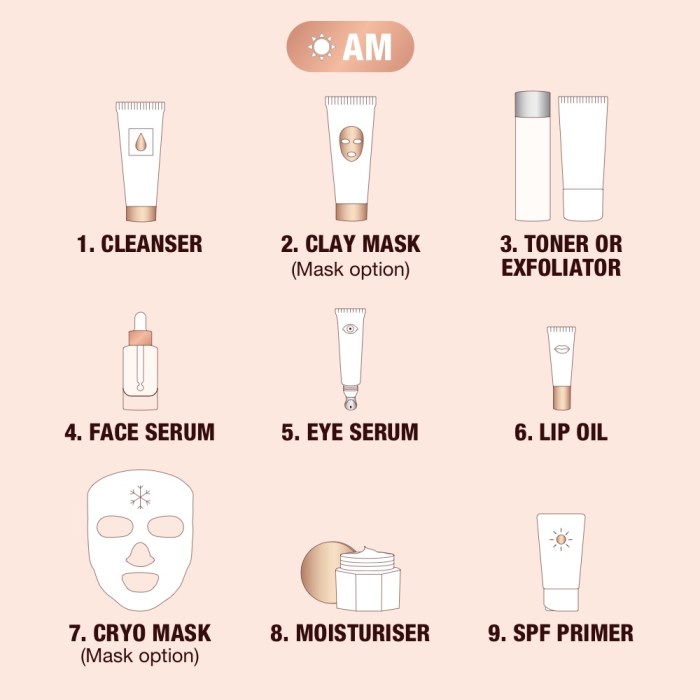Skin care routine is the key to maintaining healthy and glowing skin, so buckle up as we dive into the fundamental steps and tips for a flawless complexion.
Importance of a Skin Care Routine
Having a daily skin care routine is crucial for maintaining healthy skin. It helps in keeping the skin clean, hydrated, and protected from external factors that can cause damage.
Consistency in a skin care routine can benefit different skin types in various ways. For oily skin, using products with salicylic acid can help control excess oil production. Dry skin can benefit from moisturizers with ingredients like hyaluronic acid to hydrate the skin. Combination skin may require a balance of products to address both oily and dry areas.
Environmental factors such as pollution, UV radiation, and harsh weather conditions can have a damaging effect on the skin. A proper skin care routine can help combat these factors by providing a barrier of protection. Using products with antioxidants like vitamin C can help neutralize free radicals caused by pollution and UV exposure.
Impact of Environmental Factors
Environmental factors like pollution and UV radiation can lead to premature aging of the skin. It is essential to incorporate products with SPF for sun protection and antioxidants to combat free radicals. Regular cleansing helps remove pollutants from the skin, preventing clogged pores and breakouts.
Basic Steps in a Skin Care Routine
Taking care of your skin involves following a regular routine that includes cleansing, toning, and moisturizing. Each step plays a crucial role in maintaining healthy and glowing skin.
Cleansing
- Cleansing is the first step in any skin care routine and involves removing dirt, oil, and impurities from the skin’s surface.
- Using a gentle cleanser helps prevent breakouts and keeps the skin clean and fresh.
- It is essential to cleanse your skin twice a day, in the morning and before bed, to maintain a clean canvas for other products.
Toning
- Toning helps balance the skin’s pH levels and removes any leftover traces of dirt or makeup after cleansing.
- Using a toner can also tighten pores and prepare the skin to better absorb moisturizer and other products.
- Choose a toner that suits your skin type, whether it’s hydrating, clarifying, or soothing.
Moisturizing
- Moisturizing is crucial for keeping the skin hydrated, soft, and supple.
- It helps lock in moisture, prevent dryness, and protect the skin’s barrier.
- Select a moisturizer based on your skin type, whether it’s oily, dry, combination, or sensitive.
Choosing the Right Products

When it comes to choosing the right skincare products, it’s essential to consider your specific skin type and needs. Not all products work the same for everyone, so it’s important to tailor your routine to what works best for you.
Selecting Products for Specific Skin Types
- For Dry Skin: Look for products with hydrating ingredients like hyaluronic acid or glycerin to help moisturize and nourish your skin.
- For Oily Skin: Opt for oil-free products or those with ingredients like salicylic acid to help control excess oil and prevent breakouts.
- For Combination Skin: Use a gentle cleanser and products that balance both dry and oily areas of your skin.
- For Sensitive Skin: Choose products that are fragrance-free and hypoallergenic to prevent irritation and redness.
Reading Ingredient Labels and Avoiding Harmful Chemicals
It’s crucial to read ingredient labels on skincare products to ensure they are suitable for your skin and do not contain any harmful chemicals. Avoid products with ingredients like:
parabens, sulfates, phthalates, and artificial fragrances.
Testing Products for Compatibility
Before incorporating a new product into your skincare routine, it’s important to test it to ensure it works well with your skin. Here’s how you can do it:
- Perform a patch test on a small area of your skin to check for any allergic reactions or sensitivity.
- Introduce one new product at a time to monitor how your skin reacts without overwhelming it with multiple changes at once.
- Observe your skin’s response over a few days to a week to determine if the product is suitable for your skin type.
Day and Night Skincare Routines
When it comes to skincare, having separate routines for day and night is crucial to ensure your skin gets the proper care it needs around the clock. Daytime routines focus more on protection from environmental stressors, while nighttime routines prioritize repair and rejuvenation.
Daytime Skincare Routine
During the day, it’s important to shield your skin from harmful UV rays and pollution. A typical morning skincare routine may include the following steps:
- Cleanser to remove any dirt or oil buildup from overnight
- Toner to balance the skin’s pH levels
- Moisturizer to hydrate and protect the skin
- Sunscreen with at least SPF 30 to prevent sun damage
Remember, sunscreen is the most vital step in your daytime routine to prevent premature aging and reduce the risk of skin cancer.
Nighttime Skincare Routine
At night, your skin focuses on repairing and regenerating while you sleep. An evening skincare routine may involve the following steps:
- Makeup remover to thoroughly cleanse the skin
- Cleanser to remove impurities and leftover makeup
- Toner to prep the skin for better product absorption
- Serum or treatment to target specific skin concerns
- Moisturizer to hydrate and nourish the skin overnight
Don’t forget to give your skin some extra love at night with products that promote cell turnover and repair.
Specialized Treatments and Extras

When it comes to taking care of your skin, sometimes the basic routine might not be enough. That’s where specialized treatments and extras come in to target specific skin concerns and provide that extra boost your skin needs.
Exfoliation
Exfoliation is an essential step in any skincare routine to remove dead skin cells and reveal smoother, brighter skin. It can be done through physical exfoliants like scrubs or chemical exfoliants like AHAs and BHAs. Incorporate exfoliation 1-3 times a week, depending on your skin type and sensitivity.
Masks
Face masks can address various skin concerns such as hydration, acne, or brightening. They provide a concentrated dose of beneficial ingredients to the skin. Use masks 1-2 times a week, depending on your skin’s needs.
Serums
Serums are lightweight formulations packed with active ingredients that target specific skin concerns like aging, hyperpigmentation, or acne. They are applied before moisturizer to deliver potent ingredients deep into the skin. Incorporate serums into your routine after cleansing and toning.
Eye Creams
Eye creams are specially formulated to address the delicate skin around the eyes, targeting concerns like dark circles, puffiness, and fine lines. Use a small amount of eye cream and gently pat it around the eye area with your ring finger. Incorporate eye cream into your skincare routine both morning and night.
Targeted Treatments, Skin care routine
For specific skin concerns like acne, aging, or hyperpigmentation, targeted treatments can help address these issues effectively. Look for products with ingredients like salicylic acid for acne, retinol for aging, and vitamin C for hyperpigmentation. Incorporate these treatments into your routine as directed for optimal results.